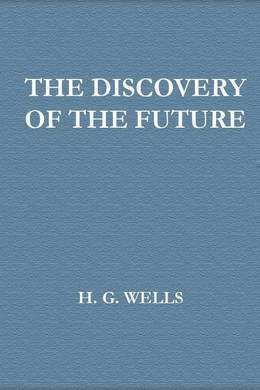
The Discovery of the Future
Discourse Delivered at the Royal Institution
by H. G. Wells
subjects: Philosophy
-
EPUB 84 KB
-
Kindle 107 KB
-
Support epubBooks by making a small $2.99 PayPal donation purchase.
Description
The Discovery of the Future is a philosophical lecture by H. G. Wells that argues for the knowability of the future. It was originally delivered to the Royal Institution on January 24, 1902. Before appearing in book form. Wells begins by distinguishing between “two divergent types of mind,” one that judges and attaches importance principally to what has happened in the past and one that judges and attaches importance principally to what will happen in the future. To the former he attributes the adjectives “legal or submissive,” “passive,” and “oriental,” and to the latter the adjectives “legislative, creative, organizing, or masterful,” and “active,” calling it “a more modern and much less abundant type of mind.”
36 pages with a reading time of ~45 minutes (9000 words), and first published in 1902. This DRM-Free edition published by epubBooks, 2014.
Community Reviews
There are currently no other reviews for this book.
Excerpt
It will lead into my subject most conveniently to contrast and separate two divergent types of mind, types which are to be distinguished chiefly by their attitude toward time, and more particularly by the relative importance they attach and the relative amount of thought they give to the future. The first of these two types of mind, and it is, I think, the predominant type, the type of the majority of living people, is that which seems scarcely to think of the future at all, which regards it as a sort of blank non-existence upon which the advancing present will presently write events. The second type, which is, I think, a more modern and much less abundant type of mind, thinks constantly and by preference of things to come, and of present things mainly in relation to the results that must arise from them. The former type of mind, when one gets it in its purity, is retrospective in habit, and it interprets the things of the present, and gives value to this and denies it to that, entirely with relation to the past. The latter type of mind is constructive in habit, it interprets the things of the present and gives value to this or that, entirely in relation to things designed or foreseen. While from that former point of view our life is simply to reap the consequences of the past, from this our life is to prepare the future. The former type one might speak of as the legal or submissive type of mind, because the business, the practice, and the training of a lawyer dispose him toward it; he of all men must constantly refer to the law made, the right established, the precedent set, and consistently ignore or condemn the thing that is only seeking to establish itself. The latter type of mind I might for contrast call the legislative, creative, organizing, or masterful type, because it is perpetually attacking and altering the established order of things, perpetually falling away from respect for what the past has given us. It sees the world as one great workshop, and the present is no more than material for the future, for the thing that is yet destined to be. It is in the active mood of thought, while the former is in the passive; it is the mind of youth, it is the mind more manifest among the western nations, while the former is the mind of age, the mind of the oriental. Things have been, says the legal mind, and so we are here. The creative mind says we are here because things have yet to be. Now I do not wish to suggest that the great mass of people belong to either of these two types. Indeed, I speak of them as two distinct and distinguishable types mainly for convenience and in order to accentuate their distinction. There are probably very few people who brood constantly upon the past without any thought of the future at all, and there are probably scarcely any who live and think consistently in relation to the future. The great mass of people occupy an intermediate position between these extremes, they pass daily and hourly from the passive mood to the active, they see this thing in relation to its associations and that thing in relation to its consequences, and they do not even suspect that they are using two distinct methods in their minds. But for all that they are distinct methods, the method of reference to the past and the method of reference to the future, and their mingling in many of our minds no more abolishes their difference than the existence of piebald horses proves that white is black. I believe that it is not sufficiently recognized just how different in their consequences these two methods are, and just where their difference and where the failure to appreciate their difference takes one. This present time is a period of quite extraordinary uncertainty and indecision upon endless questions–moral questions, æsthetic questions, religious and political questions–upon which we should all of us be happier to feel assured and settled; and a very large amount of this floating uncertainty about these important matters is due to the fact that with most of us these two insufficiently distinguished ways of looking at things are not only present together, but in actual conflict in our minds, in unsuspected conflict; we pass from one to the other heedlessly without any clear recognition of the fundamental difference in conclusions that exists between the two, and we do this with disastrous results to our confidence and to our consistency in dealing with all sorts of things.
